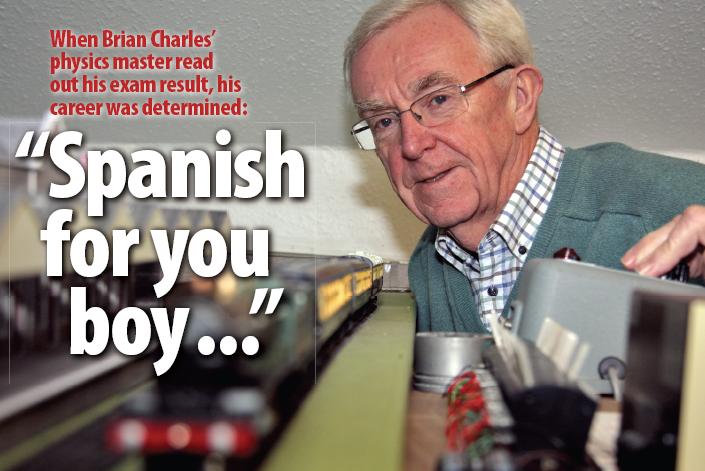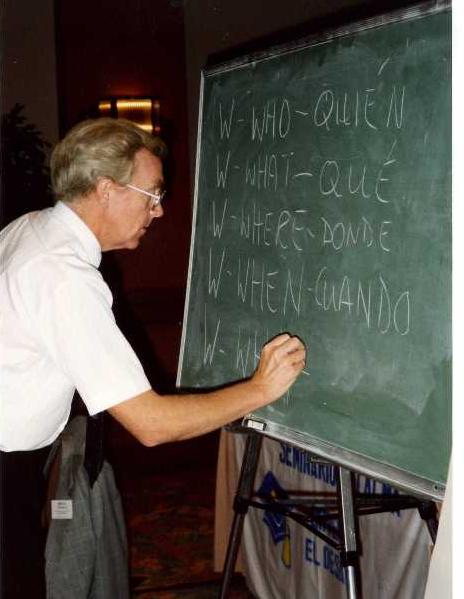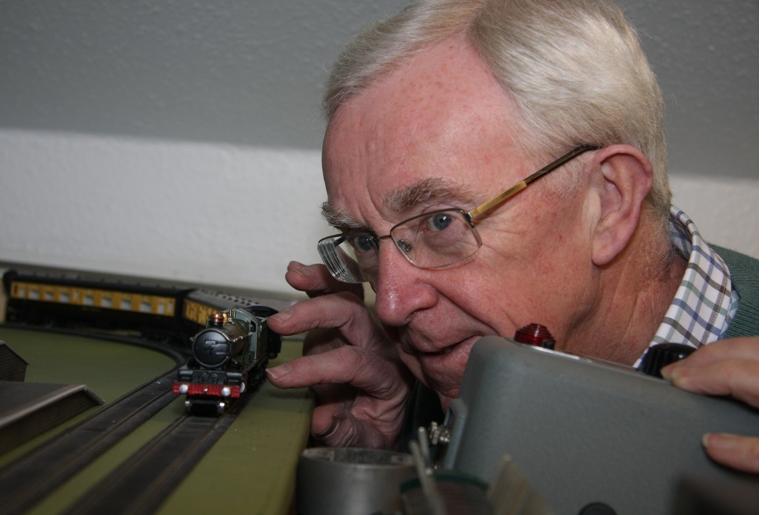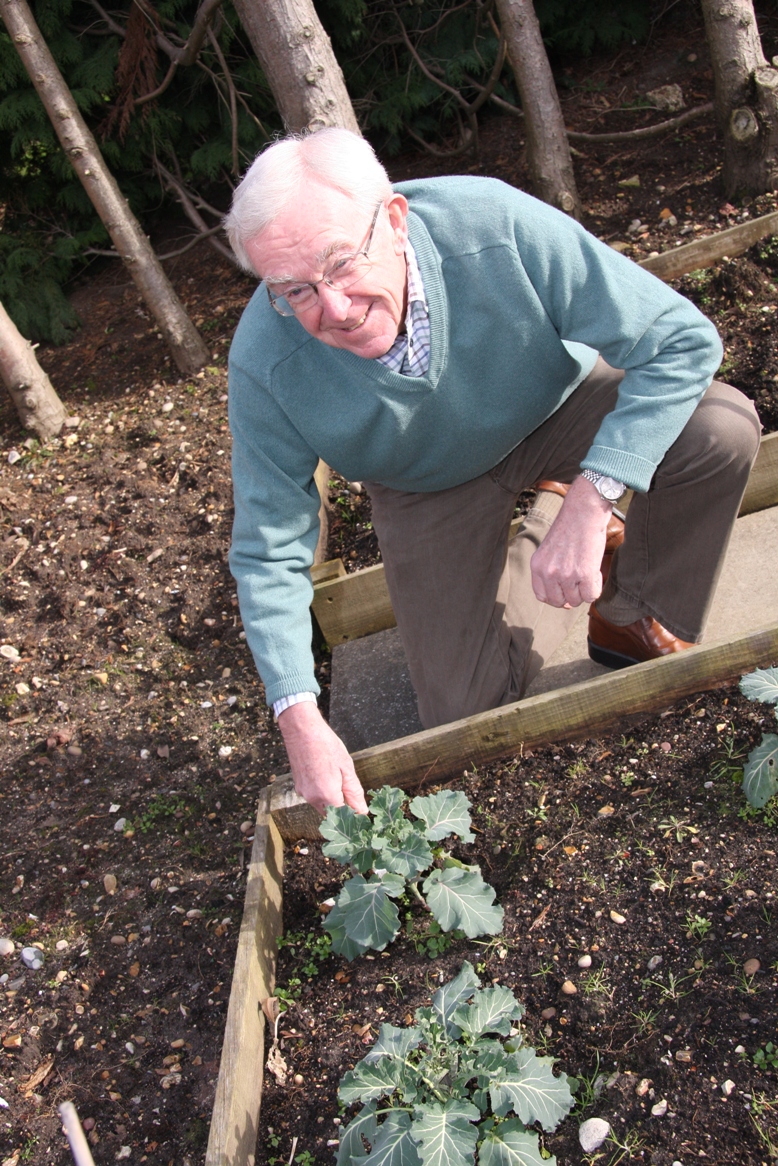Brian Charles, reflections on a career in moving: by Steve Jordan.

Last October Brian Charles was enrolled into the IAM Role of Honor for his services to the moving industry. It was an appropriate, and perhaps overdue, recognition for a man who had dedicated much of his working life to training others and to improving standards in the international moving industry. Now retired, and enjoying a slightly less hectic lifestyle with his wife Carol, Brian reflected on a career that had touched many across the world.
Brian was on holiday with friends during the IAM conference so he was unable to collect the award in person. His friend and colleague Niall Mackay from ICM Gerson collected it on his behalf. Brian had been nominated for the award by his friends at LACMA for the work he had done for LACMA and FIDI over the last 30+ years. It was this recognition by his peers, perhaps more than the award itself, that touched him most. “You don’t do it for honours,” he said, “but to give something back to the industry.” He never craved recognition, but his smile cannot disguise his joy at receiving this most precious vote of thanks.
Brian can trace his path to the international moving industry right back to his years at Neath Grammar. Brian was talented in many ways, but was not a scientist; so when his Physics master read out the exam results, his career was determined. “He went around the class alphabetically: ‘Arnold, 76%; Bridgeman, 84%, Charles,’ he lowered his glasses and glowered, ‘Spanish for you boy – 18%’.”
 And Spanish it was. He has always enjoyed languages and studied French, Spanish and Latin at school. Further education was at Wolverhampton Polytechnic (now Wolverhampton University) where he studied languages in business. His second year required him to spend six months in the country of his first chosen language. He went to Barcelona where he perfected his Spanish and put his practical talents to good use repairing engines for Villiers motorcycles. He met and married Carol while in his last year at Wolverhampton.
And Spanish it was. He has always enjoyed languages and studied French, Spanish and Latin at school. Further education was at Wolverhampton Polytechnic (now Wolverhampton University) where he studied languages in business. His second year required him to spend six months in the country of his first chosen language. He went to Barcelona where he perfected his Spanish and put his practical talents to good use repairing engines for Villiers motorcycles. He met and married Carol while in his last year at Wolverhampton.
Brian joined Michael Gerson Ltd. early in his career. He answered an advertisement in the Daily Telegraph for a position that would use his language ability, moved down to Whetstone in North London and never looked back. It was in 1970 that Colin Gordon was involved in training for the BAR Institute in the UK. He called Brian one day when he was due to present a course on international moving, explained that he was unable to attend and asked Brian to take his place. As Brian faced a room of 30 students, the scene was set for him to become the trusted face of training for the international moving industry for a generation.
Over the following years Brian continued to train for the Institute, was instrumental in designing the international removals course for the FIDI Academy and, through his mastery of Spanish, became a close friend to LACMA frequently delivering week-long courses in Spanish, in Miami. Brian estimates that he must have trained over 200 people at those LACMA courses. Anyone who has done the FIDI Academy course will probably remember the fictitious family of James T. Colby III. “He was my invention,” said Brian. “We also introduced warehouse visits and port visits at that time too.” Brian never received or requested personal payment for any of his training services. He didn’t do it for money, he did it to give something back to the industry and to improve global standards in international moving.
 Brian’s course covered everything from receiving the initial enquiry to costing, warehousing, documentation, clearance, delivery right through to insurance claims. He always tried to deliver more than the basic course. He enjoyed using his experience to work with students to explore the subject and learn beyond the syllabus. “The most useful things were when I could draw on experiences,” he said. “I often used to wander off. This is the advantage of being on your subject. Anyone can get the basics over but if people were interested I used to share experiences. We had evening discussion groups after dinner. We did role-play sketches with the students searching the hotel for props. People still remember them today. They were a lot of fun and got the message across too. I don’t believe in teaching a subject with which I am not thoroughly conversant. You can’t give the depth.”
Brian’s course covered everything from receiving the initial enquiry to costing, warehousing, documentation, clearance, delivery right through to insurance claims. He always tried to deliver more than the basic course. He enjoyed using his experience to work with students to explore the subject and learn beyond the syllabus. “The most useful things were when I could draw on experiences,” he said. “I often used to wander off. This is the advantage of being on your subject. Anyone can get the basics over but if people were interested I used to share experiences. We had evening discussion groups after dinner. We did role-play sketches with the students searching the hotel for props. People still remember them today. They were a lot of fun and got the message across too. I don’t believe in teaching a subject with which I am not thoroughly conversant. You can’t give the depth.”
Brian noticed several differences in people’s attitude to training. “In Asia and Latin America people are like sponges. They just soak up information and are continually demanding more. In the UK, however, although around 80% of people are glad to be there, 10% are only attending because their boss has sent them, and the rest would rather be somewhere else.” But Brian usually won them round in the end.
Two years ago LACMA asked Brian to do another course in Lima, Peru. He had been retired for five years and it got him thinking about succession. It was important to ensure a bank of trainers that could carry on his work so Brian arranged a train-the-trainer course, delivered in Curacao, for eight people including some well-known experienced people.
This was a good turnout but Brian feels that the industry today is still in need of experienced trainers. “Maybe it’s because the business is more competitive now. Or perhaps it’s because there are fewer, larger companies and the managers don’t have the opportunity to take time out for the benefit of others.”
But for Brian the benefits were not one sided. He never intended to generate business for his company through training but it must have encouraged some people to use Michael Gerson Ltd. as a paragon of the art. Michael Gerson Ltd. always had a high quality image but Brian’s training work certainly kept the company on its toes. It was a constant reinforcement of the brand. “There were intangible benefits but the real reason I did it was because I enjoyed it. It was very nice to see people making improvements. And I learned a lot myself too. There is no patent on good ideas.”
 Despite his high profile in the industry Brian never had any desire to hold high office. He was the Chairman of the BAR Institute in its centenary year in 2000, but he never wanted to be the president of any of the world’s associations. “I had enough going on running the business and I didn’t want all the politics. I was never tempted.”
Despite his high profile in the industry Brian never had any desire to hold high office. He was the Chairman of the BAR Institute in its centenary year in 2000, but he never wanted to be the president of any of the world’s associations. “I had enough going on running the business and I didn’t want all the politics. I was never tempted.”
As Chairman of the Institute he really felt that he was making a difference. “I was very fed up when BAR disbanded the Institute. A lot of good people had put a great deal into it over very many years. But maybe BAR is right. Perhaps it’s a logical progression.”
Over the last 40 years Brian has trained hundreds of people the world over. He has enjoyed it but recognises that he could not have done it without the help of Michael Gerson. “I learned a lot from Michael, he is the consummate business man. He would always find some way of doing things better. I am also grateful to George Taylor the company’s Operations Director who taught me the practical side of the business.”
 So what does Brian do now? He’s been retired, officially, since 2005 but there has never been a dull moment. As with many retired people he wonders how he ever had time to go to work. He busies himself with his family, doing voluntary work locally, swimming three times a week, working on the house and in the garden and, just occasionally, indulging his passion for trains. He’s also bought a home in Javea, Spain for when he feels the need to escape the British weather and when he can leave his vegetable patch to fend for itself for a while. “I’m on the go all the time,” he said. “I drive Carol potty.”
So what does Brian do now? He’s been retired, officially, since 2005 but there has never been a dull moment. As with many retired people he wonders how he ever had time to go to work. He busies himself with his family, doing voluntary work locally, swimming three times a week, working on the house and in the garden and, just occasionally, indulging his passion for trains. He’s also bought a home in Javea, Spain for when he feels the need to escape the British weather and when he can leave his vegetable patch to fend for itself for a while. “I’m on the go all the time,” he said. “I drive Carol potty.”
Would he take another job if one were offered? Well he might be able to find the odd five minutes for an interesting project just as long as it fitted in with his new lifestyle. But he’s not looking.
Brian Charles is one of a breed of statesmen with whom the moving industry was blessed for a time. I could easily run off a list of 10 or 20 of his contempories without whom the industry would have been much less colourful and would now be much the poorer. It does seem, however, that the motives that encouraged those characters to emerge and the working structures that allowed them the time, have changed. Training seems to be a much more regimented affair nowadays more focussed on getting certificates on the wall than improving practical skills. And the market is much tougher, faster moving with less room for traditional values perhaps. Whatever the reason, the likes of Brian et al we are unlikely to see again.
Unless you know different? Perhaps the global mobility industry is full of unsung heroes who genuinely deserve their moment in the spotlight. If there are, I’d like to know. Meanwhile, I trust you will join me in wishing Brian and Carol a very happy, healthy and lengthy retirement. My goodness they have earned it.
Read the editor's next pick